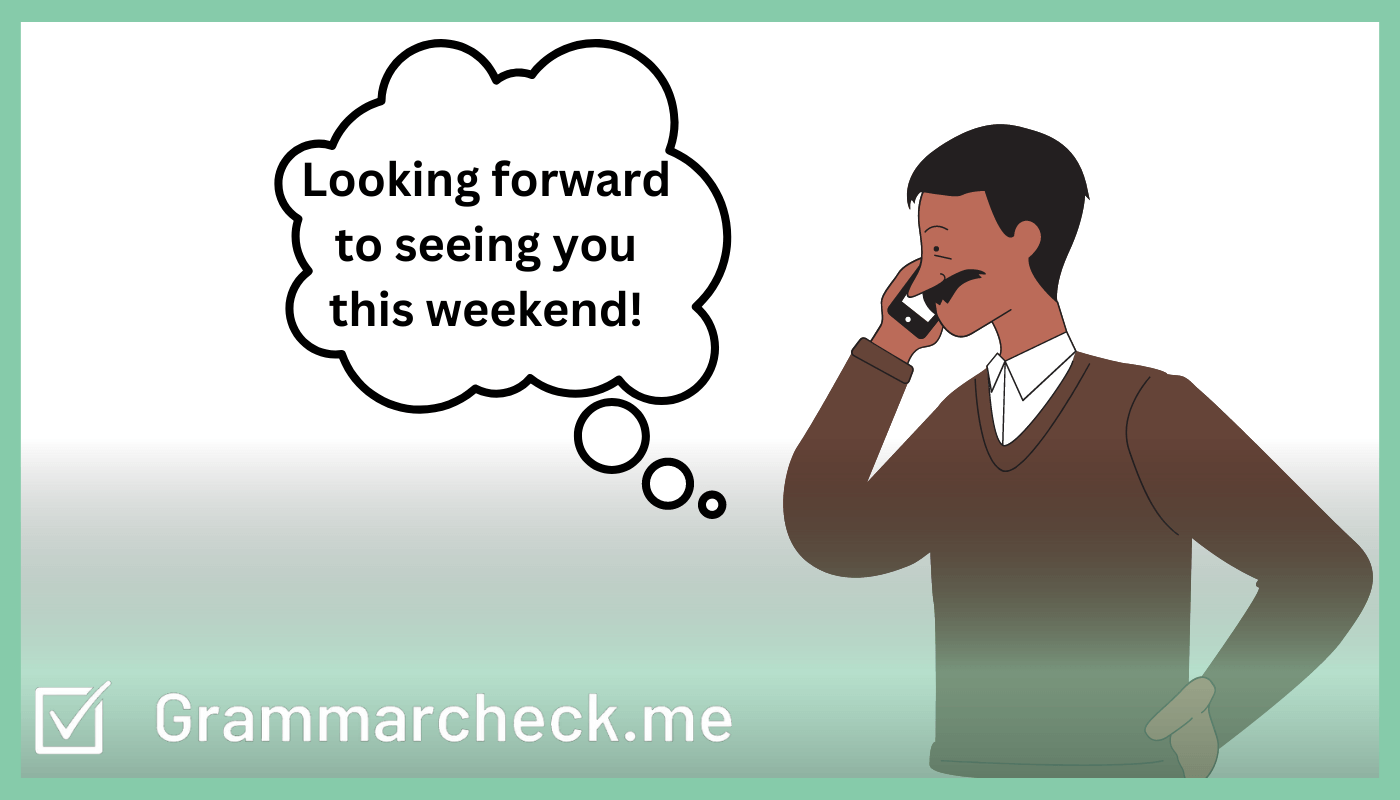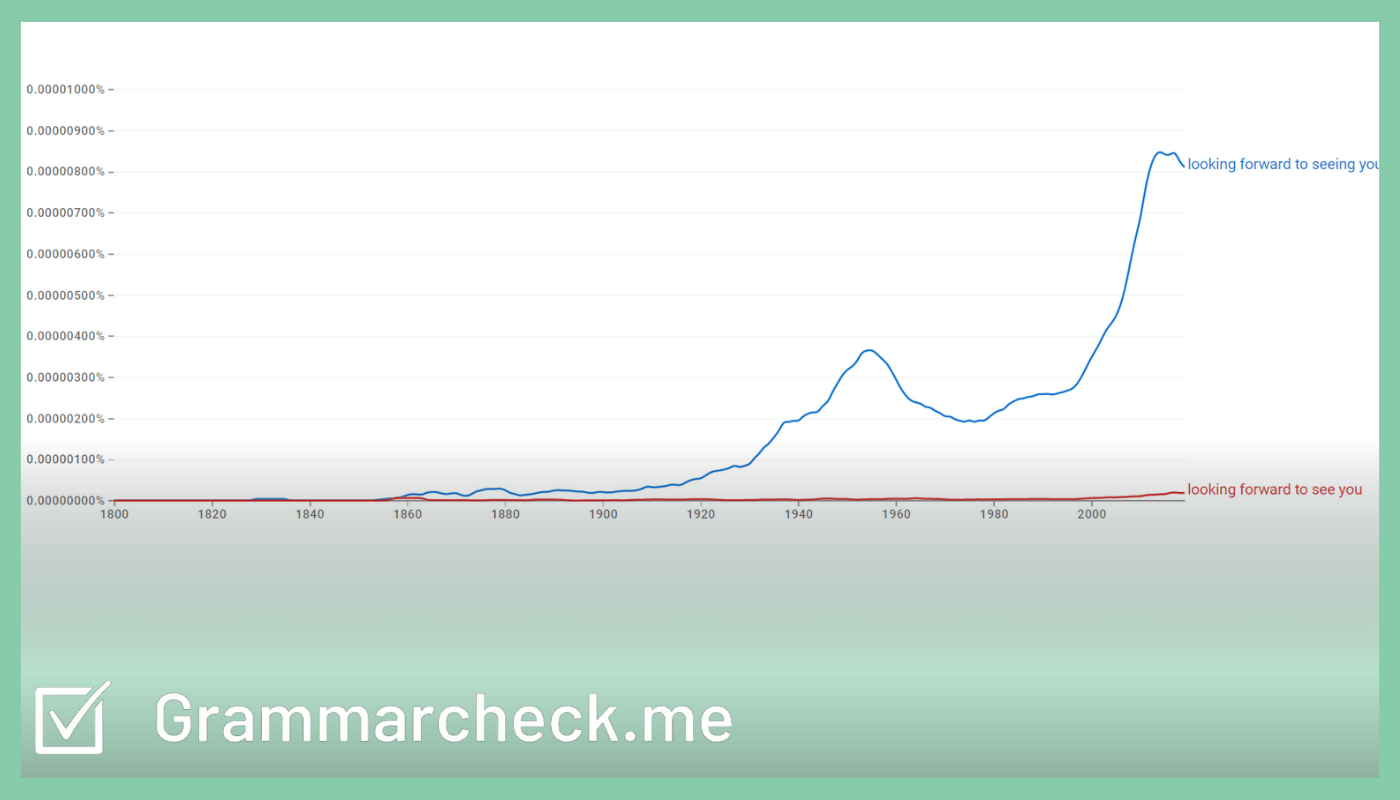The phrase “I’m looking forward to seeing you” to show anticipation and excitement for an upcoming meeting. It is not correct to use the phrase “I’m looking forward to see you”.
By understanding the distinctions between these phrases, we can ensure our writing is grammatically correct and avoid miscomunication. In this post we’ll define this popular phrase and show some examples to make things easy.

What Is The Meaning Of The Phrase “I’m Looking Forward To Seeing You”?
The phrase “I’m looking forward to seeing you” expresses a sense of anticipation or excitement for an upcoming meeting or encounter. This phrase is frequently used to demonstrate a sense of enthusiasm for an upcoming event. Here is a list of example situations in which this saying could be used.
- Before a casual get-together with friends
- Before a professional meeting
- Before a social gathering or part (i.e. wedding)
The phrase “I’m looking forward to seeing you” is more common in informal contexts & and daily conversations. It uses the phrasal verb “to look forward to” in order to demonstrate anticipation for a future event.
The phrase “I’m looking forward to see you” is grammatically incorrect & should not be used in your writing. You must use the word “see” in the -ING form (called gerund) in this context.
How Do You Use “Looking Forward To Seeing You” In A Sentence?
Here is a list of 5 example sentences that demonstrate how to use this phrase correctly.
- Hi Sarah, just wanted to say that I’m looking forward to seeing you at the party this weekend!
- Dear Mr. Johnson, I’m excited about our scheduled meeting next week and I’m truly looking forward to seeing you to discuss the project.
- Let’s plan a coffee date soon! I’m really looking forward to seeing you and hearing about all your adventures.
- We’re looking forward to seeing you there and exchanging ideas with each of you.
- I’ve missed everyone so much and I’m eagerly looking forward to seeing you all and spending quality time together.
However, just like we saw in our post about amatuer spelling, even small spelling mistakes can change the meaning of your sentence.
What Is A Phrasal Verb?
A phrasal verb, such as “paid attention” is a combination of a verb and one or more particles (usually prepositions or adverbs) that together create a new meaning. More specifically, it is a multi-word verb whose definition can change when combined with additional particles.
The phrase “to look forward to” is an example of a phrasal verb. In this case, the verb “look” combines with the particle “forward” and the preposition “to” to form a unique meaning.
- Phrasal Verb = Look + Forward + To
What Are Examples Of Phrasal Verbs?
Below is a list of 3 popular phrasal verbs that can be used in your daily conversation & writing.
- Take off: “The plane is about to take off.”
- Turn up: “Can you turn up the music?”
- Give up: “I decided to give up smoking”.
How Do You Use A Gerund After A Preposition?
A gerund is a verb form that functions as a noun in the English language. It is created by adding the “-ing” suffix to the base form of a verb. When using a gerund after a preposition, it acts as the object of the preposition.
For example, examine the sentence “I’m interested in learning”.
- “learning” is the gerund acting as the object of the preposition “in.”
- The prepositional phrase “in learning” indicates the specific interest.
List Of Synonyms For The Phrase “Looking Forward To Seeing You”
Here is a list of 5 synonyms you could use to indicate positive anticipation.
- Anticipating meeting you
- Eagerly awaiting your presence
- Excited to see you
- Anxiously looking forward to seeing you
- Counting down the days until we meet
Popularity Analysis

According to Google’s N-Gram Viewer, the phrasal verb “looking forward to” is very popular in published writing. Authors use it to indicate anticipation for an event, spending time with someone, and many other things. However, just like we saw in the post comparing the terms Anyways vs Anyway, even incorrect terms can become popular.
Frequently Asked Questions
Yes, the phrase looking forward to seeing you convey a sense of positive anticipation. This phrase is written in the present continuous tense to indicate you are looking forward to something that is going to happen.
You should avoid using this phrase in formal writing. Stick to more official and proper terms and phrases when writing in a formal context.
The Bottom Line
By now you should be an expert on the phrasal verb & transitive verb “looking forward to”. Remember, you must use the -ING ending after the verb see to be grammatically correct. If you need more help with spelling and grammar rules like this, consider using our Essay Checking Tool to make things easy!
